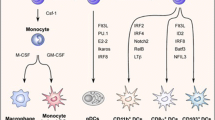Abstract
Dendritic cells (DC) are the most potent antigen-presenting cells that link innate with adaptive immunity. They circulate the body and sample the microenvironments for maintaining homeostasis and for mounting T-cell responses against invading pathogens, foreign antigens, and aberrant self-proteins. In humans, DC derived from blood monocytes (MDC) by cytokine treatment provide the most abundant and versatile source for studying DC and T-cell biology, and for use as adjuvants in cancer therapy. In asthma patients, T-cell functions are studied by using autologous MDC as accessory cells for allergen presentation. The method for isolating T cells and monocytes from peripheral blood mononuclear cells (PBMC) and the stimulation of T cells to proliferate and produce cytokines by MDC are outlined in this chapter. The method can be applied to the functional studies of T cells and DC in other diseases.
Access this chapter
Tax calculation will be finalised at checkout
Purchases are for personal use only
Similar content being viewed by others
References
Qu C, Brinck-Jensen NS, Zang M, Chen K (2014) Monocyte-derived dendritic cells: targets as potent antigen-presenting cells for the design of vaccines against infectious diseases. Int J Infect Dis 19:1–5
van de Ven R, Lindenberg JJ, Oosterhoff D, de Gruijl TD (2013) Dendritic cell plasticity in tumor-conditioned skin: CD14 cells at the cross-roads of immune activation and suppression. Front Immunol 4:403
Steinman RM (2007) Dendritic cells: understanding immunogenicity. Eur J Immunol 37:S53–S60
Villadangos JA, Schnorrer P (2007) Intrinsic and cooperative antigen-presenting functions of dendritic-cell subsets in vivo. Nat Rev Immunol 7:543–555. https://doi.org/10.1038/nri2103
Dzionek A, Fuchs A, Schmidt P, Cremer S, Zysk M, Miltenyi S et al (2000) BDCA-2, BDCA-3, and BDCA-4: three markers for distinct subsets of dendritic cells in human peripheral blood. J Immunol 165:6037–6046
Bachem A, Guttler S, Hartung E, Ebstein F, Schaefer M, Tannert A et al (2010) Superior antigen cross-presentation and XCR1 expression define human CD11c+CD141+ cells as homologues of mouse CD8+ dendritic cells. J Exp Med 207:1273–1281
Poulin LF, Salio M, Griessinger E, Anjos-Afonso F, Craciun L, Chen JL et al (2010) Characterization of human DNGR-1+ BDCA3+ leukocytes as putative equivalents of mouse CD8alpha+ dendritic cells. J Exp Med 207:1261–1271
Liu K, Nussenzweig MC (2010) Origin and development of dendritic cells. Immunol Rev 234:45–54
Shortman K, Sathe P, Vremec D, Naik S, O’Keeffe M (2013) Plasmacytoid dendritic cell development. Adv Immunol 120:105–126
Cheong C, Matos I, Choi JH, Dandamudi DB, Shrestha E, Longhi MP et al (2010) Microbial stimulation fully differentiates monocytes to DC-SIGN/CD209(+) dendritic cells for immune T cell areas. Cell 143:416–429
Randolph GJ, Beaulieu S, Lebecque S, Steinman RM, Muller WA (1998) Differentiation of monocytes into dendritic cells in a model of transendothelial trafficking. Science 282:480–483
Sallusto F, Lanzavecchia A (1994) Efficient presentation of soluble antigen by cultured human dendritic cells is maintained by granulocyte/macrophage colony-stimulating factor plus interleukin 4 and downregulated by tumor necrosis factor alpha. J Exp Med 179:1109–1118
Dhodapkar MV, Krasovsky J, Steinman RM, Bhardwaj N (2000) Mature dendritic cells boost functionally superior CD8(+) T-cell in humans without foreign helper epitopes. J Clin Invest 105:R9–R14
Thurner B, Haendle I, Roder C, Dieckmann D, Keikavoussi P, Jonuleit H et al (1999) Vaccination with mage-3A1 peptide-pulsed mature, monocyte-derived dendritic cells expands specific cytotoxic T cells and induces regression of some metastases in advanced stage IV melanoma. J Exp Med 190:1669–1678
O’Neill DW, Adams S, Bhardwaj N (2004) Manipulating dendritic cell biology for the active immunotherapy of cancer. Blood 104:2235–2246
Sung SJ, Taketomi EA, Smith AM, Platts-Mills TA, Fu SM (1999) Efficient presentation of house dust mite allergen Der p 2 by monocyte-derived dendritic cells and the role of beta 2 integrins. Scand J Immunol 49:96–105
Rossi M, Young JW (2005) Human dendritic cells: potent antigen-presenting cells at the crossroads of innate and adaptive immunity. J Immunol 175:1373–1381
Author information
Authors and Affiliations
Corresponding author
Editor information
Editors and Affiliations
Rights and permissions
Copyright information
© 2019 Springer Science+Business Media, LLC, part of Springer Nature
About this protocol
Cite this protocol
Sung, SS.J. (2019). Monocyte-Derived Dendritic Cells as Antigen-Presenting Cells in T-Cell Proliferation and Cytokine Production. In: Lympany, P., Jones, M. (eds) Allergy. Methods in Molecular Biology, vol 2020. Humana, New York, NY. https://doi.org/10.1007/978-1-4939-9591-2_9
Download citation
DOI: https://doi.org/10.1007/978-1-4939-9591-2_9
Published:
Publisher Name: Humana, New York, NY
Print ISBN: 978-1-4939-9589-9
Online ISBN: 978-1-4939-9591-2
eBook Packages: Springer Protocols




